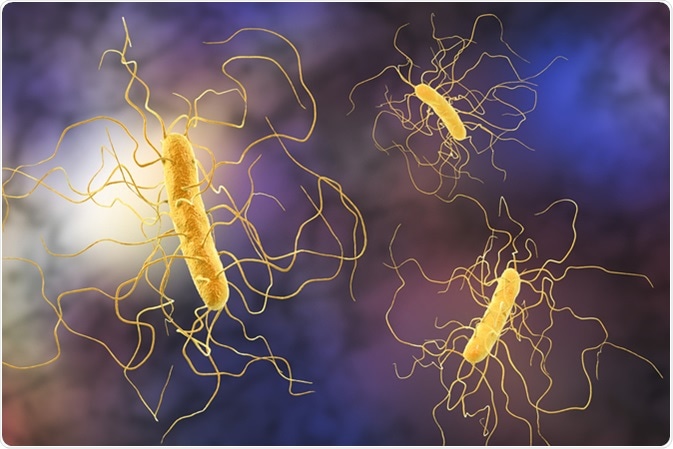Clostridium difficile (C. difficile) is a common bacterial gastrointestinal infection, causing almost half a million cases of illness in the United States each year.

Clostridium difficile bacteria, 3D illustration. Credit: Kateryna Kon / Shutterstock
The symptoms include severe diarrhea, fever, stomach pain, nausea and loss of appetite. The disease may be fatal if left untreated. About 75% of cases are hospital-acquired, and are mostly reported in individuals who have been on antibiotics for a long period of time.
Treatment for C. difficile infection
Recovery from a C. difficile infection may require one or more of several treatment options, depending on the severity and recurrence of the infection. These include:
- Antibiotics: Firstly, it is important to stop taking the antibiotic which initially led to the infection; in mild cases, this may be sufficient. Otherwise, alternative antibiotics specifically targeting C. difficile may then be recommended.
- Surgery: In rare cases, severe infections may require surgery to remove the damaged portion of the colon.
- Fecal microbiota transplant (FMT): Studies are going on to determine if individuals with recurrent C. difficile infections will benefit from a fecal transplant to restore the balance of healthy intestinal bacteria.
Nutritional management of C. difficile
As well as the treatment options mentioned above, supportive nutritional remedies for diarrhea are recommended. Severe diarrhea can lead to dehydration and an inability to absorb essential nutrients from food. Therefore, having an appropriate diet containing soft, easily digestible foods helps to combat loose stools, prevent dehydration from occurring, and recover gut health quicker.
Recommended foods that could help speed up recovery include:
- Fluids – Drinking plenty of clear liquids such as water, broths and juices. It is important that these contain essential salts to maintain electrolyte levels. In some severe cases, where patients are unable to drink sufficient amounts of liquid, intravenous fluids are recommended.
- Semi-solid foods – Starchy soft foods, such as saltine crackers, toast, eggs or rice, can be gradually added to the diet as diarrhea symptoms pass.
- Probiotics – Live microorganisms or ‘good bacteria’ are found in yogurt, kefir, sauerkraut, tempeh (fermented soybean), kimchi (fermented cabbage), pickles, and kombucha (fermented tea). These help to restore the natural bacteria in the gut, reducing C. difficile symptoms. Probiotic supplements may also be prescribed, or purchased from pharmacies over-the-counter.
- Soluble fiber – Foods rich in soluble fiber absorb excess liquid and add bulk to stools. These include: oats, legumes, bananas, oranges, apple pulp and carrots.
- Starchy foods – Easily digestible, soft, starchy foods (for example, white bread and mashed potato) are binding and help to relieve diarrhea symptoms.
- Vitamin-rich foods: The inability to absorb nutrients from food is a common side effect of diarrhea. Foods rich in calcium, magnesium, potassium and sodium are important to replenish essential nutrients.
C. Difficile Infection - Sahil Khanna, MBBS - Mayo Clinic
Foods which may irritate the gut further are to be avoided, and include:
- Cruciferous vegetables: Broccoli, Brussel sprouts, cabbage, cauliflower and kale may further contribute to abdominal bloating and discomfort.
- Raw vegetables: Uncooked vegetables release toxins in the stomach which again lead to stomach bloating. It is advised that all vegetables be thoroughly cooked, to avoid this.
- Insoluble fiber: In contrast to soluble fiber, insoluble fibers are not digestible and do not absorb water. They are found in whole-grains, rye, brown rice, nuts, seeds, cabbage, beetroot and apple skins. So ensure any apples eaten are peeled!
- Spicy food: Strongly spiced and seasoned food can irritate the stomach lining, perpetuating the gut symptoms.
- Greasy/fried food: Foods high in saturated fats, such as fast food, are again difficult to digest.
- Caffeinated drinks: Caffeine irritates the gut, prolonging the healing process. It also acts as a laxative, further contributing to diarrhea.
- Lactose: Temporary lactose intolerance is a common side effect of a C. difficile infection. Calcium-fortified, non-dairy, milk substitutes are suggested as an alternative to dairy products.
- Gluten: Many patients also develop a temporary gluten intolerance, so avoiding wheat is advised.
In conclusion, once a C. difficile infection is diagnosed, it is recommended to seek the advice of a registered nutritionist, who will set up an appropriate dietary plan to help recover gut health as quickly as possible.
Further Reading
Last Updated: Mar 20, 2019